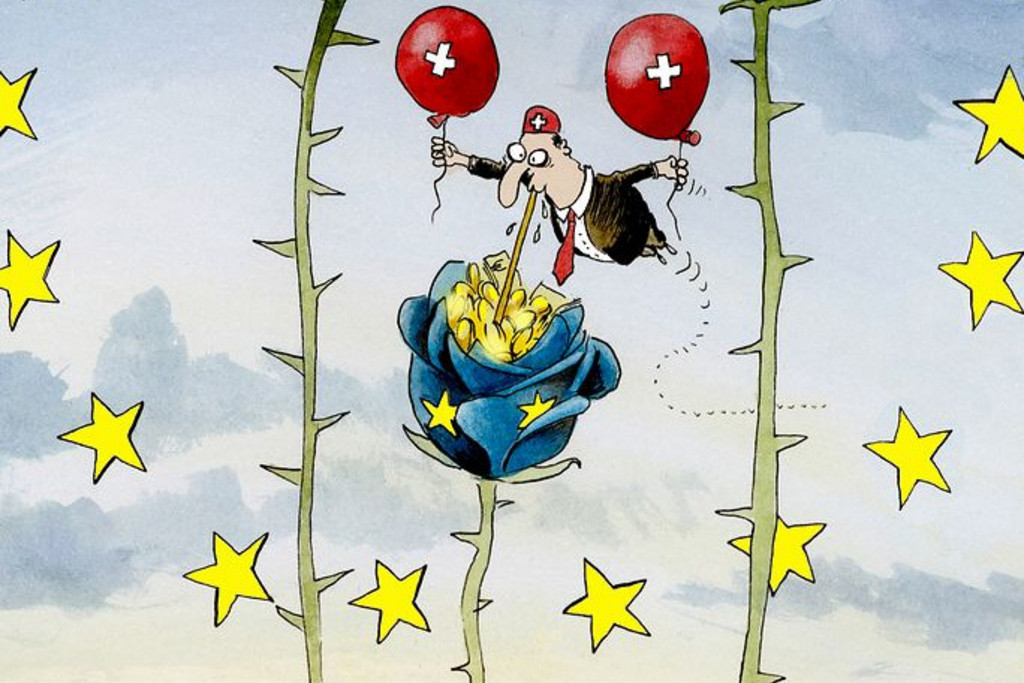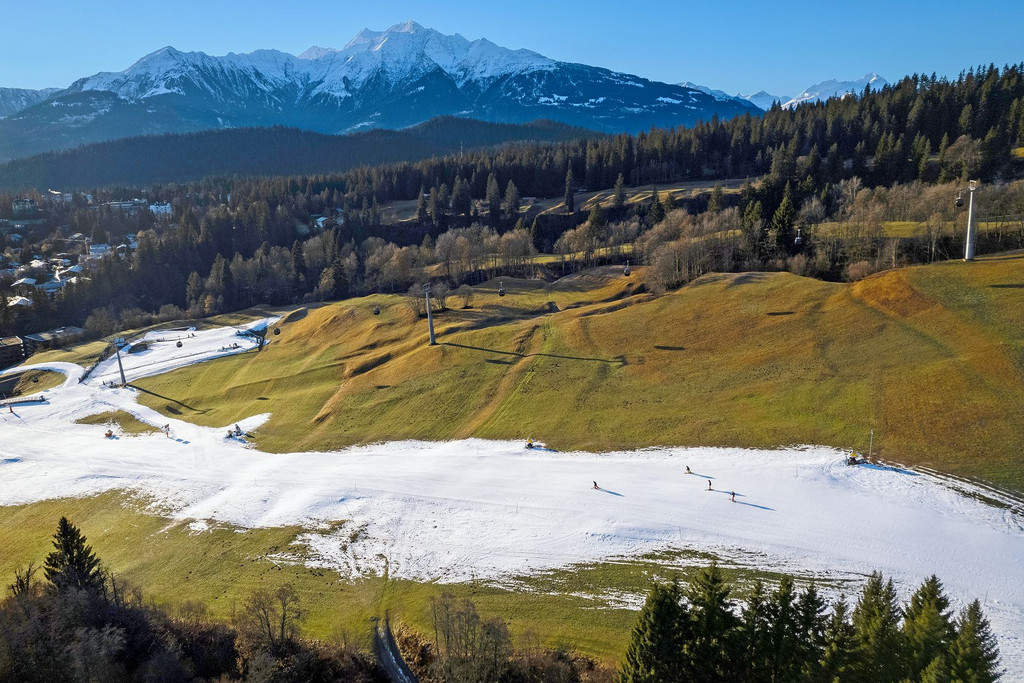SVP warns against “climate hype”
Climate and environmental policy are not at the top of the SVP’s list of priorities. Instead, the party is positioning itself as an opponent of the “climate hype” that is causing “ban mania” among the left wing. The People’s Party is focusing on freedom and individual responsibility. It opposes any new levies and fees but is supportive of tax incentives in climate and environmental policy, such as for building refurbishments. The SVP is particularly critical of Switzerland’s proposal to go it alone on halving CO2 emissions by 2030 without internationally binding resolutions from all countries. With regard to the national elections on 20 October, the SVP is banking on non-Green voters, and positioning itself as a lobby for motorists and against restrictions on mobility in the process.
Political representation: 66 seats in the National Council, 5 seats in the Council of States, 2 seats in the Federal Council.
More on the SVP’s climate policy: ogy.de/svp-klima
FDP faces green policy change
78 per cent of FDP members want to see more commitment from the party on environmental and climate matters. This was the outcome of an internal survey commissioned by FDP president Petra Gössi. The rank and file are calling for a levy on air tickets, and also want to see Switzerland reduce its CO2 emissions predominantly within the country. To date, the FDP fraction has blocked both issues in Parliament. The new approach is designed to initially lead to a position paper containing demands related to the areas of housing, transport, work/education and the environment, and serve as a guideline for FDP policy over the next few years. It remains unclear whether the party’s change of approach will lend a green momentum to the national elections.
Political representation: 33 seats in the National Council, 13 seats in the Council of States, 2 seats in the Federal Council.
More on the FDP’s climate policy: ogy.de/fdp-klima
BDP banks on Glacier Initiative
Like the CVP, the BDP supports a tough CO2 Act. After the failure of the bill in the National Council, the party originally wanted to launch its own popular initiative with the objective of not allowing any more new cars with combustion engines in Switzerland from 2040. The party later dropped the idea of such a mobility initiative and instead supported the broad-based Glacier Initiative, which aims to incorporate the goals of the Paris Climate Agreement in the constitution. The BDP is consolidating its strengths and presenting itself as a pragmatic and solution-oriented party – true to the election motto of “Boring, but good”. By dispensing with its own initiative, it may not be easy for the BDP to make ground on the climate issue in the autumn elections.
Political representation: 7 seats in the National Council, 1 seat in the Council of States
More on the BDP’s climate policy: ogy.de/bdp-klima
CVP as a majority creator
The CVP was the only centre-right party in the Federal Council to support the far-reaching measures in the CO2 Act in the National Council last year. The party committed itself to green concerns early on – most recently by supporting the energy transition. After the failure of the bill in the National Council, the party wants to play a key role for a new bill that is capable of gaining majority support. With regard to the autumn elections, the CVP wants to make ground as the “sole conservative party to consistently stand for environmental protection”. By doing so, it will disassociate itself from the SVP and the FDP, who have shown no interest in domestic CO2 reduction goals to date. The CVP also supports the levy on air tickets as well as financial incentives for home insulation and to replace oil heaters to reach the climate goals.
Political representation: 26 seats in the National Council, 14 seats in the Council of States, 1 seat in the Federal Council.
More on the CVP’s climate policy: ogy.de/cvp-klima
The SP supports ecological restructuring
The SP wants to speed up the energy transition so that Switzerland is climate-neutral by 2045. Therefore, it is calling for a fast and socially responsible shift away from fossil energies. The financial centre should also become climate-friendly. “No more investments in oil and gas should be approved.” The demand for renewable energies should enable the ecological restructuring to create around 40,000 new jobs. The party wants to achieve these goals in Parliament through numerous initiatives. The SP also supports the Glacier Initiative, which aims to incorporate climate protection in the constitution and demands the implementation of the objectives of the Paris Climate Agreement. With regard to the national elections, it will be difficult for the SP to make ground on the climate issue as the Greens are flying high.
Political representation: 43 seats in the National Council, 12 seats in the Council of States, 2 seats in the Federal Council
More on the SP’s climate policy: ogy.de/sp-klima
GLP banks on cleantech
As a traditional environmental party, members of the green-liberal GLP also see themselves on the rise. The party wants to make Switzerland a pioneer through innovation and competition in the area of climate protection. Swiss industry should bank on cleantech. This could generate a “massive export branch” as the Paris Climate Agreement also needs to be implemented in other countries. With regard to the CO2 Act, the party is campaigning for a large percentage of the emissions to be offset in Switzerland. The GLP argues that measures are not just needed for building refurbishments but also for road and aviation traffic, which have not been touched to date. Like the Greens, the Green Liberals view the autumn national elections as key – under the campaign motto: “It is time”.
Political representation: 7 seats in the National Council.
More on the GLP’s climate policy: ogy.de/glp-klima
Greens have a Greta tailwind
Environmental and climate protection are traditionally at the heart of Green policy. The Greens continue to prioritise a tough CO2 Act. They are demanding more building refurbishments and an increase in the CO2 levy. The agricultural and financial sector should also contribute to climate protection. Moreover, the Greens want to see worldwide climate equality. Switzerland should ensure that climate change-induced damage is financed according to a causation principle. During previous cantonal elections, the Greens have benefited the most from the ‘Greta Thunberg effect’. Whether they do well at a national level in the autumn depends to some extent on the climate issue remaining high on the political agenda. The Greens have pinned their colours to the climate mast by declaring the 2019 elections the “Climate Elections”.
Political representation: 11 seats in the National Council, 1 seat in the Council of States.
More on the Greens’ climate policy: ogy.de/gps-klima
The following small parties represented in the National Council were not included in the party survey: Swiss Evangelical People’s Party, EVP (2 seats), Ticino League (2 seats), Geneva Citizens’ Movement, MCG (1 seat), Partei der Arbeit, PdA (1 seat) as well as the Independents (2 seats).
Read more: “We can finally voice our concerns”






![[Translate to English:]](/fileadmin/_processed_/3/7/csm_max-spring-3-cartoons-de_3c29839370.png)



Comments